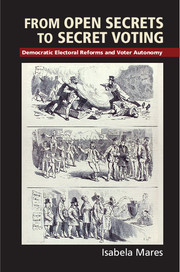Book contents
- Frontmatter
- Contents
- Figures
- Tables
- Acknowledgments
- 1 Introduction
- 2 The Protection of Voters' Autonomy
- 3 Electoral Intimidation by State Employees
- 4 Electoral Intimidation by Employers
- 5 The Production of Irregularities during Elections: A Quantitative Analysis
- 6 The Adoption of Electoral Reforms
- 7 Labor Scarcity, Rural Inequality, and Electoral Reforms: The Determinants of Electoral Reform in the Prussian Electoral System
- 8 Voting for Opposition Candidates: Economic Concentration, Skills, and Political Support for Social Democracy
- 9 Dilemmas on the Right and the Road to Proportional Representation
- 10 From Macro- to Micro-Historical Analysis in Comparative Research
- References
- Index
- Other Books in the Series
10 - From Macro- to Micro-Historical Analysis in Comparative Research
Published online by Cambridge University Press: 05 July 2015
- Frontmatter
- Contents
- Figures
- Tables
- Acknowledgments
- 1 Introduction
- 2 The Protection of Voters' Autonomy
- 3 Electoral Intimidation by State Employees
- 4 Electoral Intimidation by Employers
- 5 The Production of Irregularities during Elections: A Quantitative Analysis
- 6 The Adoption of Electoral Reforms
- 7 Labor Scarcity, Rural Inequality, and Electoral Reforms: The Determinants of Electoral Reform in the Prussian Electoral System
- 8 Voting for Opposition Candidates: Economic Concentration, Skills, and Political Support for Social Democracy
- 9 Dilemmas on the Right and the Road to Proportional Representation
- 10 From Macro- to Micro-Historical Analysis in Comparative Research
- References
- Index
- Other Books in the Series
Summary
In prewar Germany, a silent process of democratization took place during the final decades of the nineteenth century. This process unfolded through a series of piecemeal reforms of the administration of elections that attempted to provide better protection of voter autonomy. Questions about the size of the ballot, the size of the urn, the location of the urn in the voting place, and whether election officials should shake urns before counting ballots carried large political weight. Both opponents and supporters of changes in electoral institutions understood that these micro-regulations in the administration of the electoral process had profound consequences not only for political competition and the relative strength of different parties, but also for more abstract ideals such as electoral freedom.
Empirically, this book examined how this process of electoral reform un- folded in Germany between 1870 and 1912. The adoption of reforms in this electoral authoritarian context resulted from the confluence of two distinct transformations. First, economic changes such as labor scarcity and increases in economic heterogeneity raised the costs of electoral intimidation for private actors. Secondly, in political terms, the rise in strength of parties that lacked access to the repressive state apparatus and to the economic actors with the means to engage in electoral intimidation contributed to an increase in the size of the electoral coalition that supported reforms. The adoption of legislation that protected electoral secrecy, I showed, had important consequences for the rise in political strength of the largest opposition party: the Social Democrats. These reforms also had more indirect consequences for different parties on the right and facilitated the formation of an electoral coalition supporting the adoption of proportional representation.
In what follows, I consider and reflect on the contributions made in this book and their consequences for other cases of democratization. I begin in Section 10.1 by discussing the broader methodological contribution of this study to comparative historical analysis.
- Type
- Chapter
- Information
- From Open Secrets to Secret VotingDemocratic Electoral Reforms and Voter Autonomy, pp. 231 - 242Publisher: Cambridge University PressPrint publication year: 2015



